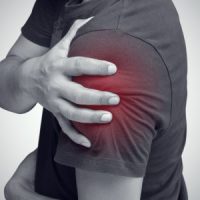How Do Rotator Cuff Injuries Happen?

Let’s say you are in a car accident. At first, you seem fine. You don’t specifically recall hitting any part of the inside of your car. But after a few hours—maybe even a day—you feel a dull ache in your shoulder. It gets worse. In a short time, you are finding that you can’t really raise your arm above your head without pain. What’s going on? You could have a rotator cuff injury.
What’s a Rotator Cuff?
Unlike many other joints, the shoulder joint allows your arm to move in almost every direction. Inside your shoulder, your humerus (arm bone) sits inside a little “holder” in your shoulder, just like a golf ball may sit on a golfing tee.
Because of the large range of motion, it takes a series of tendons to keep the arm inside of the socket in your shoulder. The series of tendons that do this, are called, collectively, your rotator cuff.
Signs You Have a Rotator Cuff Injury
Like most injuries, you’ll know you have a rotator cuff injury. The pain can be sudden, severe, and acute, but it isn’t always. Sometimes it’s dull. Unlike a muscular injury, which will cause pain when the muscle is used, with a rotator cuff injury, the shoulder will hurt, even when at rest. And you almost always will have some weakness in the shoulder and pain on full movement.
Be aware that because the rotator cuff is made up with tendons, the standard X-rays that are given in most emergency rooms, won’t detect a rotator cuff tear. For that, you’ll need an MRI, which is not usually given in hospital emergency rooms.
How Does the Injury Happen?
You can probably imagine that any kind of direct trauma to your arm will cause a rotator cuff injury. But you can tear your rotator cuff tendons, even if your shoulder isn’t directly impacted.
That’s because in many car accidents, the driver’s arms will tense up, in an attempt to brace the body from impact, or keep the torso from being flung forward. When you tense (stiffen) your arm, the impact of the accident travels up your arm, and the shoulder area absorbs that impact. Your torso moves forward with the impact of the accident, but your shoulders, braced by your stiffened arms, do not—that force can tear and separate the rotator cuff.
The same dynamic happens when someone falls. They may instinctively put their arms out in front of them, to brace the fall. When their hands or elbows hit the ground, the force goes up their arm, and is absorbed by the shoulders.
Treatment
Treatment for rotator cuff injuries can vary, based on the severity of the injury. Major tears can require surgery. For partial or less serious tears, anti inflammatory medicines or therapy may alleviate pain and symptoms.
Did you injure your shoulder in an accident?. Call the Boston personal injury lawyers at The Law Office of Joseph Linnehan, Jr. today at 617-275-4200 for help and for a free consultation about getting compensation for your injuries.
Sources:
my.clevelandclinic.org/health/diseases/8291-rotator-cuff-tear
hopkinsmedicine.org/health/conditions-and-diseases/rotator-cuff-injury
